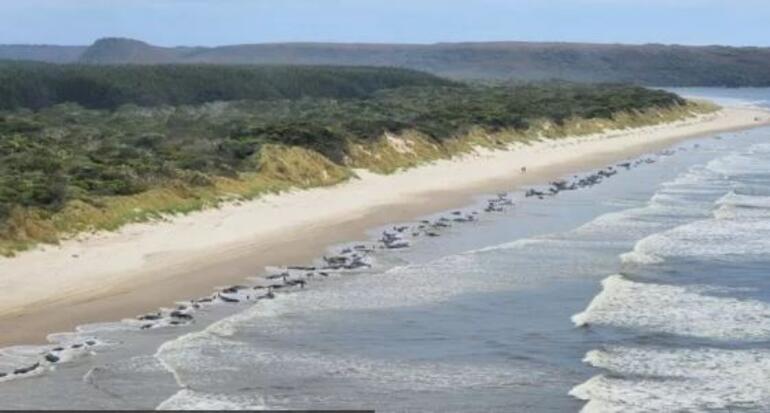BBC English Photo: HUON AQUACULTURE
230 whales have been spotted on the west coast of the Australian island of Tasmania. Half of the herd is thought to be still alive. Rescue teams were dispatched to the area.
It is unknown why the whales enter the flat beach at the Macquarie Harbor entrance.
Two years ago, in the same region, many whale had hit the shore.
also on Tuesday TasmaniaThe washed up bodies of 14 sperm whales, which have not yet reached adulthood, were found in the north of Turkey.
Experts warned that 230 whales were planned to be rescued, but due to the location, it would be a “complicated” operation.
“Half the whales appear to be alive,” the Tasmanian Department of Natural Resources and Environment said in a statement.
However, the harbor where the whales are located is located in a wide and shallow bay in an uninhabited region, and it is stated that more whales may die tonight.
Locals try to keep the whales alive by wrapping them in blankets and pouring buckets of water on them.
Authorities reported that marine conservation experts will try to re-float the whales, which are still alive and able to swim, to the open sea after they reach the scene.
class=”medianet-inline-adv”>
Black (guide) whales wash ashore in groups; because they are very social creatures and they move around in large groups and in constant communication.
In September 2020, nearly 500 land whales washed ashore in the same port, of which 100 were rescued.

Wildlife expert Vanessa Pirotta said there were similarities between the two recent events and that it was “unusual and alarming”.
Pirotta said the whales may have gone in the wrong direction by following a lead whale who is sick or has trouble navigating.
It is stated that environmental change caused by climate change, changes in water temperature or the habitats they hunt can make it difficult for whales to determine their direction.
Pirotta says the beaching of whales remains a “mystery,” and it’s not known why it’s happening so often in Tasmania.
The fact that a large number of sea creatures live in this region may cause frequent repetitions of the events.
class=”medianet-inline-adv”>
Emphasizing that the “giant island” may pose a navigation hazard for animals that determine their direction through echolocation, Pirotta says, “You swim in open waters and suddenly you come across land.”
.
